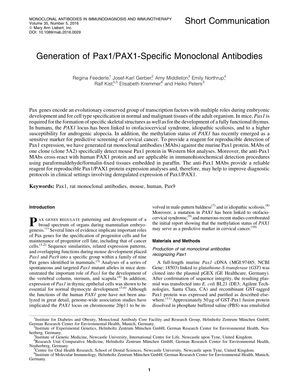Generation of Pax1/PAX1-Specific Monoclonal Antibodies
October 2016
in “
Monoclonal antibodies in immunodiagnosis and immunotherapy
”

TLDR Researchers created specific antibodies that detect a protein important in development and various conditions, and can be used for research and diagnosis.
In 2016, researchers successfully generated rat monoclonal antibodies (MAbs) that were specific to the mouse Pax1 protein and also cross-reactive with the human PAX1 protein. These transcription factors are significant in embryonic development and are associated with various conditions, including otofaciocervical syndrome, idiopathic scoliosis, androgenic alopecia, and as a marker for cervical cancer. The MAbs, particularly from clone 5A2, were confirmed to specifically detect mouse Pax1 without cross-reactivity to the similar Pax9 protein, as shown in Western blot analyses and immunohistochemical detection in fixed tissues. Furthermore, these antibodies were able to stain human PAX1 in embryonic tissue samples, indicating their potential for use in expression studies and diagnostic applications. The study was not a clinical trial and therefore did not involve human subjects.






